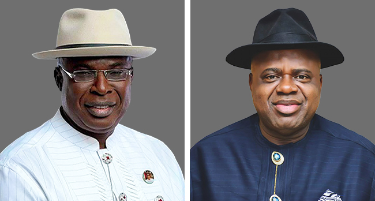The Court of Appeal in Abuja has dismissed the appeal filed by the All Progressives Congress (APC) and its governorship candidate, Timipre Sylva, challenging the judgment of the Bayelsa State Governorship Election Petition Tribunal. This tribunal had, on May 17, 2024, upheld the election and the subsequent return of Senator Douye Diri and his deputy, Senator Lawrence Eruwjadkpo, as the legitimately elected governor and deputy governor, respectively.
Justice James Abundaga, who delivered the lead judgment of the Court of Appeal, reaffirmed the declaration of Diri and the People’s Democratic Party (PDP) as the winners of the November 11, 2023, gubernatorial election. In a decisive ruling, the court dismissed the appeal, solidifying the tribunal’s earlier decision that validated Diri’s and Eruwjadkpo’s election victory. Furthermore, the court imposed a cost of N500,000 on the APC and Sylva, to be paid to the respondents in the appeal.
The appellate court’s decision was based on a thorough review of the evidence presented. It concluded that the appellants failed to provide credible evidence proving that elections took place in 184 polling units in the Nembe, Ogbia, and Southern Ijaw areas. The court noted that, according to the evidence and exhibits presented, the Independent National Electoral Commission (INEC) did not conduct elections in the disputed areas, rendering the issue of vote collation moot.
 This ruling marks a significant moment in the political landscape of Bayelsa State. The initial election, held on November 11, 2023, had been a contentious one, with various allegations and counterclaims made by both major parties. However, the tribunal’s May 2024 judgment and the subsequent affirmation by the Court of Appeal have provided a definitive resolution to the electoral dispute.
This ruling marks a significant moment in the political landscape of Bayelsa State. The initial election, held on November 11, 2023, had been a contentious one, with various allegations and counterclaims made by both major parties. However, the tribunal’s May 2024 judgment and the subsequent affirmation by the Court of Appeal have provided a definitive resolution to the electoral dispute.
Senator Douye Diri’s tenure has been marked by various initiatives aimed at improving the state’s socio-economic conditions, and the court’s decision allows his administration to continue its work without the cloud of legal uncertainty. The APC and Timipre Sylva’s challenge was seen as a significant test of the electoral process and the judiciary’s role in upholding democratic principles.
Justice Abundaga’s ruling also underscores the judiciary’s commitment to ensuring that elections are conducted fairly and that the true will of the people is respected. The imposition of costs on the appellants further emphasizes the court’s position on the need for credible evidence in electoral disputes and the importance of discouraging frivolous appeals.
As the political dust settles, the focus in Bayelsa now shifts to governance and the continuation of policies and projects initiated by the Diri administration. The ruling is expected to provide a period of stability, allowing the state government to address pressing issues and work towards the development goals set out in their agenda.
For the APC and its supporters, the court’s decision is a setback, but it also serves as a reminder of the rigorous standards required to challenge electoral outcomes successfully. Moving forward, it is anticipated that political actors will be more circumspect in their approach to electoral litigation, recognizing the judiciary’s demand for substantial and credible evidence to support any claims of irregularities or malpractices.




